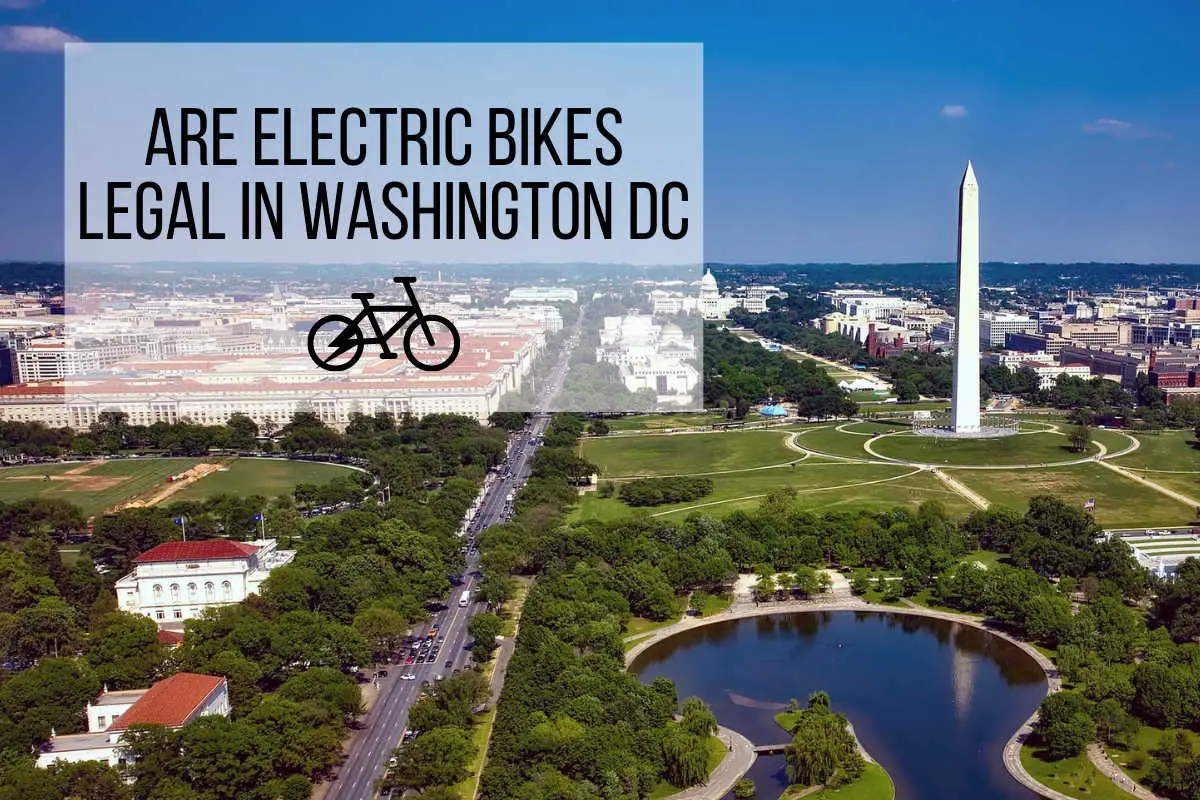Washington D.C. and the District of Columbia are unique in the amount of bicycle usage and commuting in from other states. D.C has the second highest rate of commuters in the US and nearly 5% of those do it by bicycle.
While you might think this would mean Electric Bike laws in D.C. are fairly up to date – they’re in fact lagging behind. The ideal Class 1, 2 +3 system isn’t used in D.C. even though neighboring states do.
Maryland and Virginia are clearer in their E-Bike laws and classes. If you commute or plan to ride between them through trails or for a day out it’s worth reading up. We’ve covered the latest laws to clarify whether Electric Bikes are legal in Washington D.C.
Legal Disclaimer: We are not giving legal advice and you shouldn’t take this as the law. This is just a collection and summation based on what we interpret from local laws. We aim to keep it up to date but can’t guarantee anything.
We’re using the terms Washington D.C, District of Columbia, or D.C. interchangeably – though the laws apply to the District overall. Any specific City laws are noted.
Are Electric Bikes Legal In Washington DC / District Of Columbia?
Yes, Electric Bikes are legal to ride in Washington D.C. and the District of Columbia. As long as you stick to the regulations of what they call a “motorized bicycle” then you can buy and ride your own E-Bike.
What Class Electric Bikes Are Allowed In Washington D.C?
In D.C. law an E-Bike is referred to as a “Motorized bicycle” with the following definitions: –
- A post mounted seat or saddle for each person that the device is designed and equipped to carry;
- A vehicle with 2 or 3 wheels in contact with the ground, which are at least 16 inches in diameter;
- Fully operative pedals for human propulsion; and
- A motor incapable of propelling the device at a speed of more than 20 miles per hour on level ground.
That means as long as your Electric Bike can’t go over 20 mph and has working pedals, 2 or 3 wheels, and a seat for each person – it is legal.
This means that Class 1 and Class 2 Electric Bikes are allowed in the District of Columbia. There are no limits on needing to power the bike by throttle or pedals, just that the pedals work.
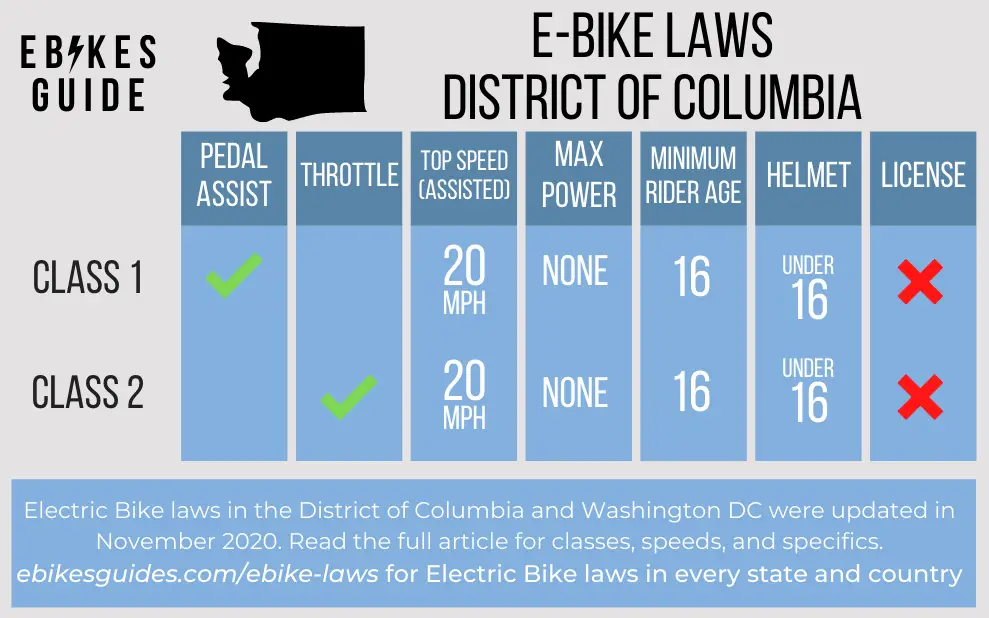
E-Bikes in DC must have a white front light plus a red reflector or light on the rear when riding at night. You also need at least one working brake, and a bell or similar for signaling to others.
The bike will also need a label with the class, speed, and the watt power. This should come from the manufacturer or you can buy them if you make your own E-Bike.
For more on Class 1, 2 + 3 read – What Are Electric Bike Classes?
Top Watt Power For Electric Bikes In Washington DC
In theory, there is no Watt power limit in DC. We’d say a 750W max is suggested in case laws change to match the suggested classes and limits in the future.
Are Class 3 E-Bikes Legal In District Of Columbia?
You also can have a Class 3 Electric Bike or one that goes over 20 mph but under 30 mph. This would not be classed as a “motorized bicycle” and would come under a “Motor-driven cycle”.
For these, you’d need a license with the “M” or motorcycle endorsement. You’d also need insurance and to pay a registration fee to the DMV. You would have to wear a helmet and couldn’t ride on the sidewalk or in bike lanes. Anything capable of above 30 mph would be a motorcycle.
Because of these regulations, we wouldn’t recommend any Electric Bike sold as a Class 3 in D.C. Hopefully the law will be changed to allow Class 3 E-Bikes under 28 mph as is common in other states. Contact your representative.
We will only cover laws and regulations for Class 1 and 2 E-Bikes or “Motorized bicycles” in this article.
There is another class that is more likely to be used for Electric Scooters, called the “Electric mobility device”. This is for a device under 60 pounds with an electric motor, for a seated or standing user. Rules are very different for these and we won’t cover them here.
Important: Hired E-Bikes and E-Scooters are treated differently than privately owned Electric Bikes. Under D.C. law they’re known as “Shared Fleet Devices”. We aren’t covering them here and you should learn more through the hire company/app you’ll use.
For more on Class 1, 2 + 3 read – What Are Electric Bike Classes?
How Fast Can Electric Bikes Go In Washington D.C?
20 mph is the limit for E-Bikes in Washington D.C. This applies everywhere they can go but may be lower on trails or paths they have access to.
Do You Need A License Or Plate For E-Bikes In District of Columbia?
No, for the standard Class 1 or 2 E-bike you don’t need a driver’s license, or to pay for registration or a plate. With a Class 3, you would have to pay as for a moped.
Do You Need Insurance For E-Bikes In D.C?
No, the DMV for D.C. specifically states you don’t need insurance to ride an Electric Bike.
What Is The Electric Bike Minimum Age in District Of Columbia?
E-Bike riders must be 16 years or older in D.C. There is a specific regulation for Electric Bikes that can be found here.
Do You Have To Wear A Helmet When Riding An Electric Bike In Columbia?
There is actually no specific law covering helmets for E-Bikes in D.C. However, standard bicycle law requires helmets for cyclists under 16. We recommend sticking to this – ideally wearing a helmet no matter your age.
Can Electric Bikes Carry Passengers In Washington D.C?
Electric Bikes in D.C. must have a “seat or saddle for each person”. That means no backies or getting a quick lift.
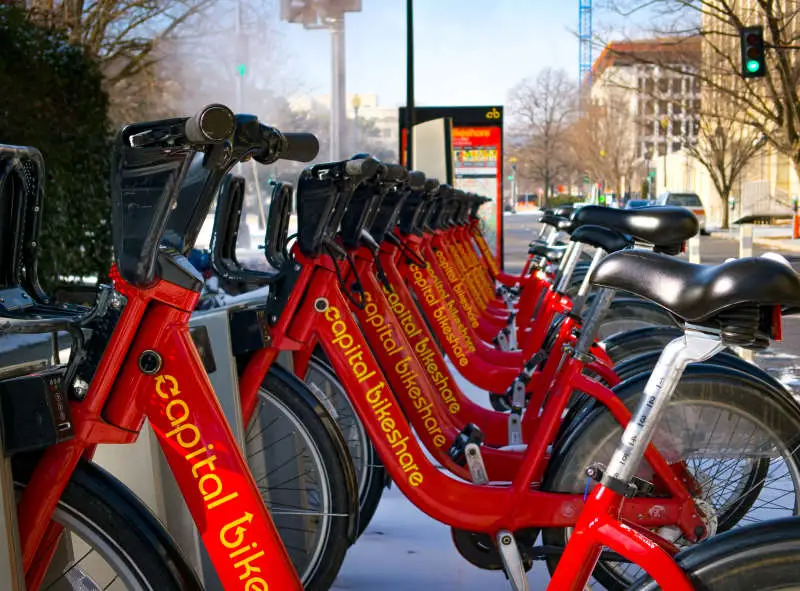
Are E-Bike Laws Different To Standard Bicycle Laws In Washington D.C.?
Right now E-Bikes are treated differently in law to bicycles – mainly in where they can go.
E-Bikes aren’t supposed to go on sidewalks, off-street bike paths, or bicycle routes. This applies when you are just pedaling the bike along yourself and not using the power. Read on for more clarification as this isn’t cut and dried.
You can overtake as long as it’s safe, don’t have to use bikes lanes if they’re there, and can only go side by side or two abreast on bike paths.
DWI laws still apply, and you are still liable for traffic signals like bicycles are. Much of the regulations covering bicycles and E-Bikes are now the same as clarified here.
Are Throttle Electric Bikes Legal In D.C?
Yes, you can have a throttle E-Bike in D.C. if you’d like. You can also have just pedal-powered or both, as the law makes no definition of how power is delivered.
That means you can get a Class 1 or 2 Electric Bike or one that can classify as both.
Do You Need A Speedometer On Electric Bikes In Washington D.C?
No, you don’t need a speedometer on a privately owned Electric Bike in D.C.
Is There A Weight Limit For E-Bikes In D.C?
There is no weight limit for E-Bike riders or cargo in the District of Columbia. As long as you can hold at least one handlebar you will probably be OK. However, if you’re riding unsafely or can’t see the road properly this falls under standard D.C. traffic law.
Can You Get Fined For Riding An Electric Bike In District of Columbia?
If your Electric Bike goes over 20 mph or falls out of the definition of a “motorized bicycle” and you haven’t registered it as something else, you could have it impounded or confiscated.
Standard traffic laws apply, you can’t skip red lights, and you can’t hold on to other vehicles.
Drinking / Drug Laws For E-Bikes In D.C.
DUI and DWI laws do apply to Electric Bikes as they do to standard bicycles. D.C. law specifically states “No person shall operate or be in physical control of any vehicle… ” while intoxicated.
A BAC of 0.8 or higher is an offense. For a first offense, you can get up to 90 days in jail with a fine of up to $1000. Over 0.20 is a minimum of 10 days in jail, a 0.15 BAC is 15 days minimum, and over 0.30 is 20 days minimum. Points and penalties on an E-Bike can affect your driving license.
Testing positive while driving under the influence of prohibited drugs is a minimum of 15 days of jail time for Schedule I substances. By driving any vehicle, D.C. law assumes you give consent to a test.
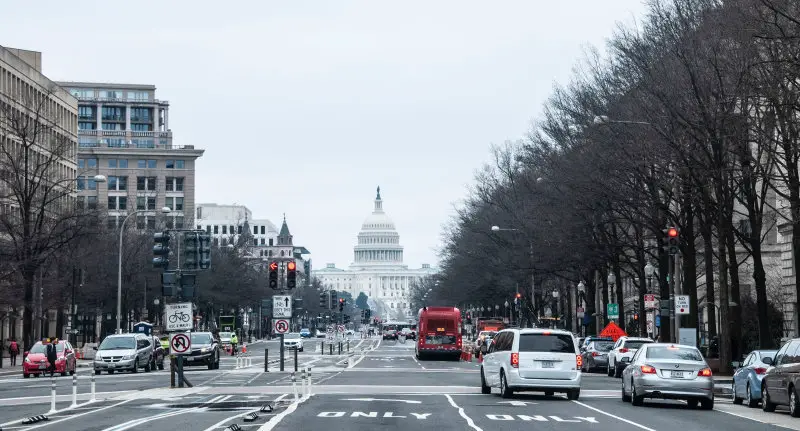
Where Is It Legal To Ride An Electric Bike In District Of Columbia?
Unfortunately in D.C. you are more restricted on an E-Bike as compared to a standard bicycle. Class 1 and 2 E-Bikes have some of the same rights as standard bicyclists, all outlined below.
Note that a Class 3 E-Bike would be a “Motor-driven cycle” and have none of these rights, essentially only being allowed to use the road like a moped or motorbike.
Can You Ride An Electric Bike On The Sidewalk In District Of Columbia?
E-Bikes are not allowed to be operated on sidewalks in D.C. You can still park and lock them up but not be using them actively. For hire Electric Bikes and Scooters this may be different.
Can You Ride An Electric Bike On The Road In District Of Columbia?
Yes, you can ride on all roads that normal bicycles can with an Electric Bike. You must ride with the direction of traffic and not against it – unless in a contraflow bike lane.
Can You Ride An Electric Bike In Bike Lanes In District Of Columbia?
Yes, you can ride an Electric Bike in a bike lane in D.C. though you don’t have to use it if there is one
Can You Ride An Electric Bike On Bike Paths In District Of Columbia?
Electric Bikes are specifically not allowed on any “off-street bike path or bicycle route within the District”. That means no bike paths however there are moves to allow specific paths to make their own decisions. Check before riding.
Can You Ride An Electric Bike On Trails In District Of Columbia?
The trails in D.C. have all been given their own authority to choose if E-Bikes are allowed and what restrictions there are. You should check the specific trail before you go.
Can You Ride Electric Bikes In National and State Parks In District Of Columbia?
State parks in D.C. are allowed to make their own choices about whether Electric Bikes are allowed – in a similar way to National parks.
All classes of Electric Bike are allowed in all National Parks wherever normal bicycles are allowed. National Parks are governed by the National Park Service (not the state), who are given jurisdiction over E-Bike use.
Importantly, the National Mall and Constitution Gardens are NPS parks so by default allow E-Bikes.
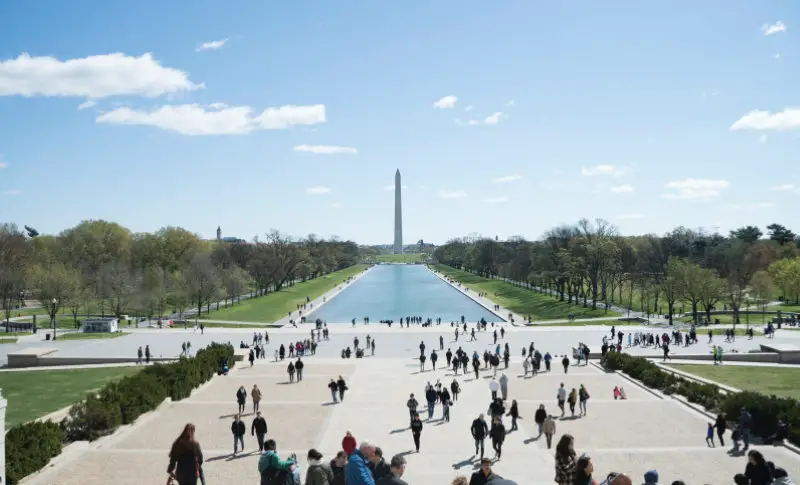
However, the intent is that E-Bikes should be used (pedaled) like regular bicycles, and exclusive use of a throttle for all riding is prohibited. Put simply you should be pedaling all of the time, though a little throttle use is OK.
Some parks do have their own restrictions so check the specific park you’d like to visit. National Forests also have their own jurisdiction and often restrict Electric Bikes.
Are DIY E-Bikes Legal In New York
Yes, DIY E-Bikes are legal in New York. That means you can build your own from scratch, add a kit to an existing bike, or modify your Electric Bike for more power, a bigger battery, or better software.
However, you must still stay within the State’s Class system and guidelines, as well as follow standard bike safety laws.
You’ll also need to affix a new permanent label with the new class, top assisted speed, and watt power. The label must be in Arial font of at least 9-point type.
Full Electric Bike Laws In District Of Columbia
The latest law that updated Electric Bike rules is the D.C. Act 23-486, called the “Shared Fleet Devices Amendment Act of 2020”. You can read it in full here.
It was effective as of November 16th, 2020, and mainly covers fleets of electric scooters and bikes, targeting the new for-hire services like Jump and Bird. It was originally called the “Electric Mobility Devices Amendment Act of 2019”.
“Safe operation of Bicycles and Motorized bicycles” can be found here, click “view text” to see everything. It covers how you can use your Electric Bike in Washington DC and the District of Columbia.
There is another act called the “Vulnerable User Collision Recovery Amendment” that is being debated and may come into law in mid-2021 – you can read it here. It should make it easier for riders or electric bikes and scooters to be compensated in crashes.
§ 50–2201.02 of the Code of the District of Columbia defines “Motorized bicycle” in D.C Law. Read it here. It classifies all the different vehicles, motor or otherwise.
Many of the DMV’s rules for E-Bikes can be found here in their synopsis on “Non-Traditional Motor Vehicles”.
